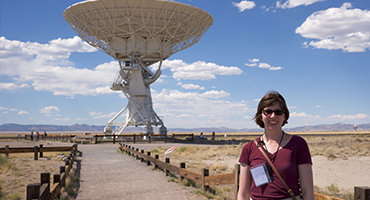PhD alumna Deborah Good awarded 2022 CASCA Plaskett Medal for best PhD thesis

Congratulations to UBC Physics & Astronomy PhD alumna Dr. Deborah Good (now a postdoctoral fellow at the University of Connecticut), who has been awarded the 2022 J. S. Plaskett Medal for Most Outstanding PhD Thesis. The award, established by the Royal Astronomical Society of Canada and the Canadian Astronomical Society, is made annually to the Ph.D. graduate from a Canadian university who is judged to have submitted the most outstanding doctoral thesis in astronomy or astrophysics within the last two calendar years.
Deborah received her PhD in 2021 under the supervision of Dr. Ingrid Stairs. In receiving this award, Deborah is recognized by CASCA for her important contribution through her PhD thesis.
Her thesis, “Timing Pulsars and Detecting Radio Transients with CHIME,” includes groundbreaking work on the first few months of pulsar and fast radio burst detections with CHIME. To complete this research, she led efforts within the CHIME team to calibrate instruments, write software, verify events, and is on the cutting edge of trying to discover whether or not all Fast Radio Bursts are repeating events. She also collected pulsar data, discovered many new pulsars, and adapted the NANOGrav pipeline to work for CHIME data, laying the groundwork for data processing that will be needed in the next couple of years.
"Receiving the Plaskett Medal is a huge honor, and I'm proud to have my work recognized by my fellow astronomers," shared Deborah. "But I also couldn't have done this without support from my wonderful collaborators, at UBC, across Canada, and around the world. It's an honor for everyone who's been part of these projects as well as for myself."
Deborah will be invited to address one or the other of the sponsoring Societies (at her choice) at their Annual Meeting, and to submit an invited article for the Journal of the Royal Astronomical Society of Canada (JRASC). She will also receive an honorarium as part of the award. Deborah is now a postdoctoral researcher at the University of Connecticut and the Flatiron Institute Center for Computational Astrophysics, applying what she learned about pulsar timing data combination during her Ph.D. to a larger project, the International Pulsar Timing Array.
Cognratulations again Deborah!
Deborah summarizes “Timing Pulsars and Detecting Radio Transients with CHIME”
As a Ph.D. student at UBC, I used the Canadian Hydrogen Intensity Mapping Experiment (CHIME) to study pulsars and Fast Radio Bursts (FRBs). CHIME is a radio transit telescope located in the Okanagan region of British Columbia. It has no moving parts and observes the entire Northern sky every day as the Earth rotates. This enables us to search for transients without knowing when or where they'll appear and to observe every pulsar in the Northern hemisphere almost every day.
During my Ph.D., I led an effort to find and characterize new pulsars and rotating radio transients (RRATs) with CHIME/FRB and CHIME/Pulsar. I also led an effort to add CHIME/Pulsar data to the North American Nanohertz Observatory for Gravitational Waves (NANOGrav) pulsar timing array dataset. Finally, I conducted follow-up observations with the Arecibo Observatory to search for more bursts from FRBs discovered with CHIME, providing new constraints on FRB repetition and insights into a possible low-repetition rate population.
Learn more
- Read Deborah's thesis through UBC's Open Collection: Timing pulsars and detecting radio transients with CHIME
- Watch Deborah's presentation during the Semi Final of UBC's Three-Minute-Thesis competition in 2020 below